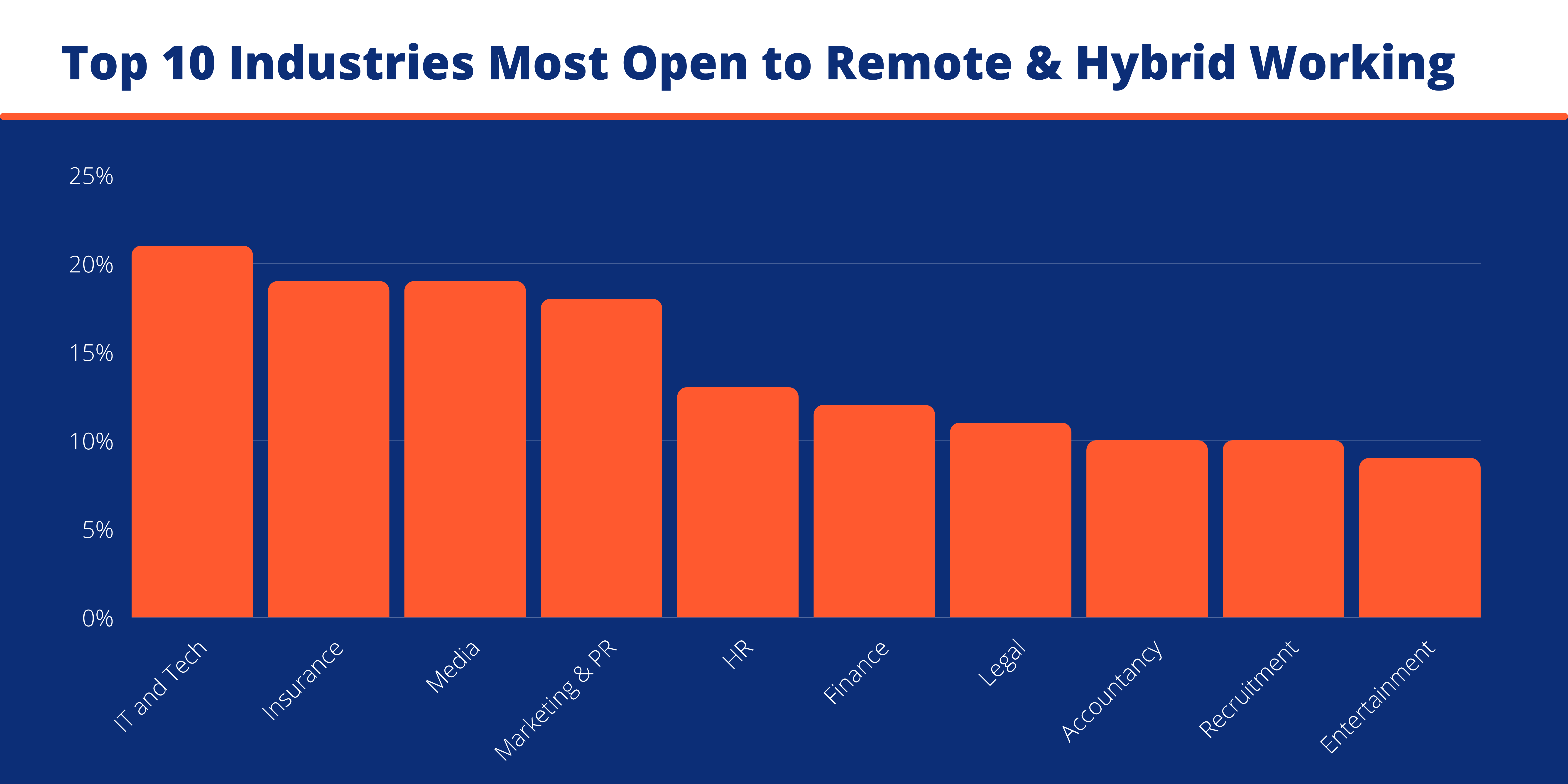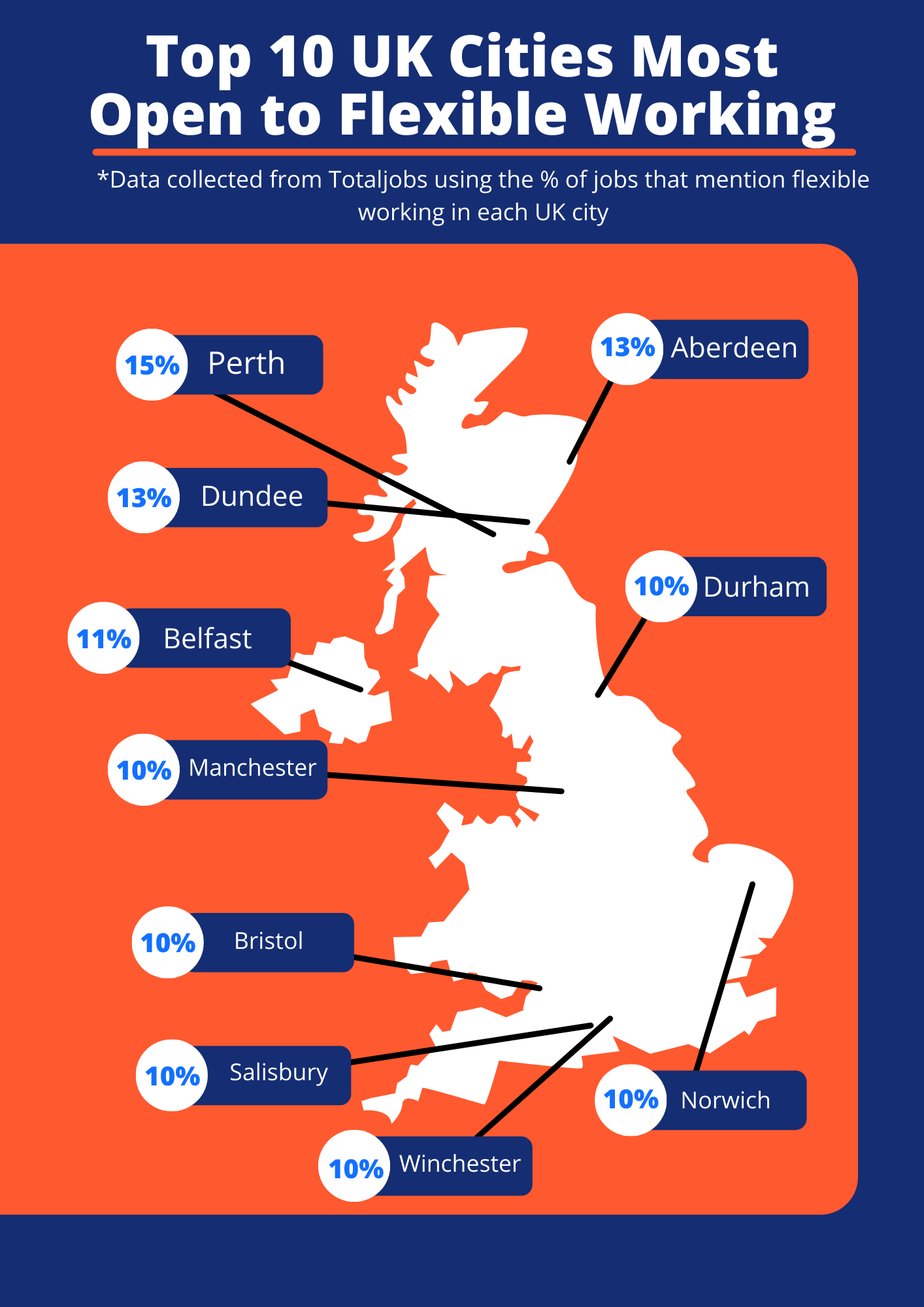Which industries and cities are most open to flexible and remote working?
The number of people working from home has grown dramatically over the last couple of years - figures from the Office for National Statistics (ONS) show that 2020 saw 37% of working adults did their jobs remotely, compared with 27% in 2019.
The pandemic was obviously the main driver behind this growth - lockdowns meant we had to stay at home and away from the workplace - but it seems some businesses are happy to keep some sort of remote working in the long term.
ONS figures have also revealed that of those businesses that never permanently = stopped trading during the pandemic, 24% stated that they intended to use increased homeworking going forward, with the Information and Communication industry recording the highest proportion (49%).
But what jobs are most likely to offer the staff the chance to work from home? And are there any regions that are more receptive to remote working than others? The number-crunchers here at business energy experts Bionic decided to do a bit of digging.

What are the UK’s best work from home jobs and cities?
To work out which jobs and cities are the best for anyone wanting to work from home, we scoured several job sites - including Reed, Indeed and Totaljobs - to assess which industries are most open to remote working, and which cities offer the greatest number of jobs that cater for flexible working.
For comparison, we also looked at those industries less likely to offer remote working - such as retail and hospitality - along with the ones more open to flexible working hours, and those cities that are best for finding jobs in these areas.
Best industries for remote and hybrid working
The industries that are most open to remote and hybrid working (whereby employees split their time between working at home and at your business premises) are:
| Industry | % of jobs |
| IT and Tech | 21% |
| Insurance | 19% |
| Media | 19% |
| Marketing and PR | 18% |
| Human Resources | 13% |
| Finance | 12% |
| Legal | 11% |
| Accountancy | 10% |
| Recruitment | 10% |
| Entertainment | 9% |

Best cities for flexible working
The top three cities were all Scottish. Two were from South West, one was from the North East, one was Northern Irish, one was from North West, and two were from South East.
| City | % of jobs |
| Perth | 15% |
| Aberdeen | 13% |
| Dundee | 13% |
| Belfast | 11% |
| Manchester | 10% |
| Norwich | 10% |
| Salisbury | 10% |
| Winchester | 10% |
| Durham | 10% |
| Bristol | 10% |

What are the best cities to work in if you can't telecommute?
Some industries - like retail or social care, aren't built for remote or hybrid working. In that case, where is best for workers hoping to scout potential job opportunities? Bionic used Totaljobs to decipher which areas of the UK are best for finding jobs in each industry where remote working isn't possible:
Construction
| City | Number of jobs |
| Birmingham | 655 |
| Manchester | 614 |
| Bristol | 501 |
Education
| City | Number of jobs |
| Manchester | 588 |
| Birmingham | 337 |
| Leeds | 195 |
Healthcare
| City | Number of jobs |
| Manchester | 458 |
| Birmingham | 407 |
| Bradford | 295 |
Hospitality
| City | Number of jobs |
| Manchester | 505 |
| Birmingham | 447 |
| Bristol | 334 |
Manufacturing
| City | Number of jobs |
| Manchester | 275 |
| Birmingham | 247 |
| Bradford | 248 |
Property
| City | Number of jobs |
| Manchester | 102 |
| Birmingham | 107 |
| Bristol | 96 |
Public Transport
| City | Number of jobs |
| Manchester | 109 |
| Wolverhampton | 142 |
| Liverpool | 78 |
How to work from home
Remote working can be great for work/life balance, but get it wrong and your productivity could drop. It's important to remember that working from home is about more than sitting on the sofa with your laptop. If you don’t structure your day and stay disciplined, you can easily find your working day has been decimated by online shopping, social media, daytime TV, and housework.
Here are five top tips to stay motivated and make the most of working from home:
1. Get up and get ready
With no commute to contend with, it can be all too tempting to get up and open your laptop about five minutes before you’re due to start work. But as appealing as spending the whole day in your joggers might seem, it can blur the boundaries between work and home life, which can be a disaster for productivity.
So, get out of bed and get ready as you normally would if you were commuting to work, and use the extra time to prepare for the day ahead by making meals and sorting your to-do list. This will mean you’re dressed, prepared and fully switched on for the workday ahead.
2. Get into a routine
There are lots of distractions when working from home - aside from the usual pitfalls of online shopping, there’s daytime TV and a whole load of housework that needs doing. Adding some structure to your day can help eliminate certain distractions, so try to get into a routine of regular work and frequent breaks.
The Pomodoro Technique, for instance, means working solidly for 25 minutes then taking a break for five. Even if you have your head buried deep into a project, this short break every 25 minutes can really help to clear your mind, especially if you use it to get away from your screens by going outside, dipping into a newspaper or magazine, or getting one chapter of a book read.
3. Step outside
One of the major drawbacks of working from home is that you can spend too much time indoors. If you’re set up to work from your living room, you might only ever leave your work area to make food and sleep. If you work from your bedroom then that feeling of cabin fever can be even worse.
So try to get outside as much as possible. This could be something as simple as stepping outside the front door in one of your five-minute breaks or taking a walk to the shops during your lunch break. If you can get outside for some exercise, that’s even better.
4. Work out when you’re most productive
One of the main benefits for remote workers is that they’re not restricted by the nine-to-five. And you can make sure this flexible routine has an even greater effect by figuring out when you’re most productive and making sure you’re working during these hours.
For some, this will mean waking up and working at the crack of dawn, for others it will be beavering away into the night. If you usually crash early in the afternoon, then put this time aside for a long break. If your job allows a real level of flexibility, make sure you use it to your advantage to better your work/life balance and improve productivity.
5. Make sure staff have all the equipment you need
This is one for the business owners out there - if you want your staff to successfully work from home, you need to make sure they have all the equipment they need to work as effectively from home as they do in the office.
Make sure employees have the right laptops, webcams, video or conference call facilities, and even a reliable broadband connection. If communication is key for their day-to-day job, it might even be worth making the switch to VoIP. It could also be worth installing productivity and scheduling apps on their devices to help them manage their workload.
If every day feels like it's one long procession of waking up, working, and going to sleep, you could be suffering from work from home fatigue. If this is the case, check out our five ways to combat work from home burnout - if you're a business owner, it also has some useful information on how to spot burnout in your employees, and the best ways to deal with it.




